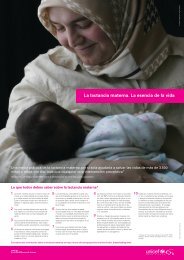SEXUAL ABUSE AND EXPLOITATION OF BOYS IN SOUTH ASIA A ...
SEXUAL ABUSE AND EXPLOITATION OF BOYS IN SOUTH ASIA A ...
SEXUAL ABUSE AND EXPLOITATION OF BOYS IN SOUTH ASIA A ...
You also want an ePaper? Increase the reach of your titles
YUMPU automatically turns print PDFs into web optimized ePapers that Google loves.
addition, except for local coordination of stakeholders, this Plan of Action does not include<br />
the NCPA in its membership or among its implementing partners.<br />
Implementation of the Plan of Action has met with limited success. Research and awarenessraising<br />
has been conducted and registration has been strengthened for guest houses and hotels<br />
for foreign tourists. However, as with plans of action throughout the region, there has been<br />
insufficient involvement of government child protection agencies and limited collaboration<br />
between NGOs and the government. NGOs remain the primary actors in addressing tourism<br />
aimed at child sexual exploitation. Notably, little has been done to address domestic sex<br />
tourism or exploitation of children by local residents, and the exploitation of boys and girls is<br />
still perceived as being perpetrated by foreign visitors.<br />
8.4 Programme Responses<br />
8.4.1 Children’s participation<br />
Consultations with children were conducted during development of the National Plan of<br />
Action for Children in Sri Lanka. Children raised the issues of sexual abuse, corporal<br />
punishment and early marriage and demanded more participation in policy and programme<br />
decision-making regarding children’s issues. A children’s parliament, the Sri Lankan<br />
Children’s Challenge, took place in 2002. Children from all social strata expressed their<br />
concerns about violence and abuse at home and school.<br />
Although there have not been numerous activities to promote children’s direct input into<br />
policy-making, children’s views have been extensively collected by researchers over the<br />
years, and this input has informed the development of both programmes and policy. UNICEF<br />
has recently supported the Sri Lanka Tourist Board to conduct knowledge, attitude and<br />
practice studies related to tourism for child sexual exploitation. In one study, 2,500 school<br />
children were interviewed for their knowledge and views on sexual exploitation in travel and<br />
tourism. 450 Save the Children, UNICEF and Plan International have supported many activities<br />
with local partners to enhance the participation of children and the expression of their views<br />
on abuse, corporal punishment and concerns in the home and school.<br />
8.4.2 Monitoring and data collection<br />
The NCPA monitors abuse cases, carries out investigations and advises the government on<br />
child-related issues. ILO has supported the NCPA to establish an anti-trafficking unit, which<br />
carries out surveillance to detect incidents of child abuse. The NCPA is expected to<br />
coordinate monitoring and data collection of government agencies and NGOs on child sexual<br />
abuse and exploitation. Health officials are legally required to report suspected incidents of<br />
child abuse and neglect. 451<br />
450 Sri Lanka Tourist Board and MG Consultants, 2007, ‘Knowledge, attitudes and practices of school children<br />
and their parents in relation to child sex tourism: Final report’.<br />
451 World Health Organization (Krug, E.G. et al.), 2002, ‘World report on violence and health’,<br />
141










